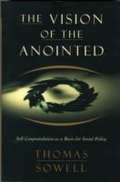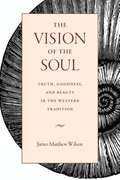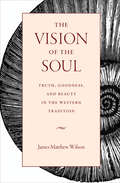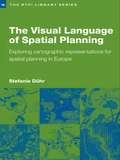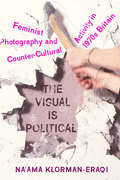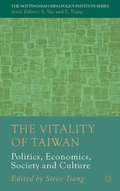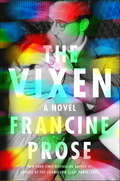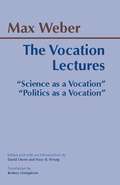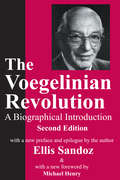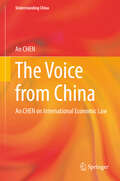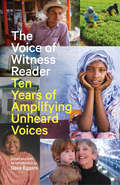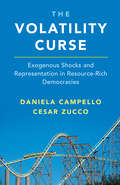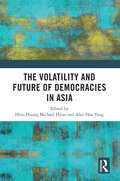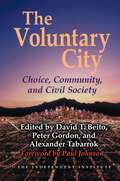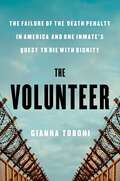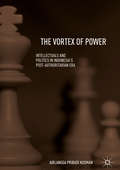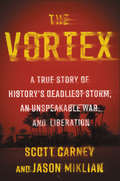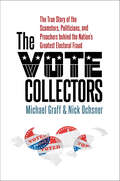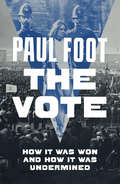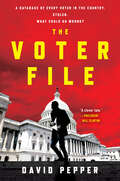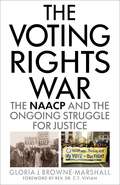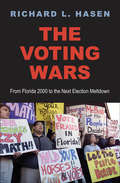- Table View
- List View
The Vision of the Anointed: Self-Congratulation as a Basis for Social Policy
by Thomas SowellSowell presents a devastating critique of the mind-set behind the failed social policies of the past thirty years. Sowell sees what has happened during that time not as a series of isolated mistakes but as a logical consequence of a tainted vision whose defects have led to crises in education, crime, and family dynamics, and to other social pathologies. In this book, he describes how elites--the anointed--have replaced facts and rational thinking with rhetorical assertions, thereby altering the course of our social policy.
The Vision of the Anointed: Self-congratulation as a Basis for Social Policy
by Thomas SowellSowell presents a devastating critique of the mind-set behind the failed social policies of the past thirty years. Sowell sees what has happened during that time not as a series of isolated mistakes but as a logical consequence of a tainted vision whose defects have led to crises in education, crime, and family dynamics, and to other social pathologies. In this book, he describes how elites-the anointed-have replaced facts and rational thinking with rhetorical assertions, thereby altering the course of our social policy.
The Vision of the Soul: Truth, Beauty, and Goodness in the Western Tradition
by James Matthew WilsonStory-telling is foundational to the forms of the fine arts, but it is no less foundational to human reason. Human life in turn constitutes a specific kind of form―a story form. The ancient conception of human life as a pilgrimage to beauty itself is one that we can fully embrace only if we see the essential correlation between reason and story and the essential convertibility of truth, goodness and beauty in beauty. By turns a study in fundamental ontology, aesthetics, and political philosophy, Wilson's book invites its readers to a renewal of the West's intellectual tradition.
The Vision of the Soul: Truth, Goodness, and Beauty in the Western Tradition
by James Matthew Wilson&“For those for whom conservatism means something more than anti-liberalism . . . who wish to dive deep into the conservative tradition in search of pearls&” (The American Conservative). Ours is an age full of desires but impoverished in its understanding of where those desires lead—an age that asserts mastery over the world but also claims to find the world as a whole absurd or unintelligible. In The Vision of the Soul, James Matthew Wilson seeks to conserve the great insights of the western tradition by giving us a new account of them responsive to modern discontents. The western- or Christian Platonist–tradition, he argues, tells us that man is an intellectual animal, born to pursue the good, to know the true, and to contemplate all things in beauty. By turns a study in fundamental ontology, aesthetics, and political philosophy, Wilson&’s book invites its readers to a renewal of the West&’s intellectual tradition. &“Conservatism needs a new prophet. James Matthew Wilson is the man for the job, and The Vision of the Soul is his calling card . . . A new classic. For it we give thanks to God, and to Plato.&” —Covenant &“James Wilson&’s important book returns to a conservatism in the tradition of Burke, Eliot, and Russell Kirk. . . . He wants us to focus on beauty and its place in Western culture. The book is a strong defense of that culture, but not an unthinking one.&” —Crisis Magazine &“A stirring and timely account and defense of the West&’s traditional way of understanding the universe and our place in it.&” —Matthew M. Robare, The Kirk Center
The Visual Language of Spatial Planning: Exploring Cartographic Representations for Spatial Planning in Europe (RTPI Library Series)
by Stefanie DührAt a time when strategic spatial planning is undergoing a renaissance in Europe, The Visual Language of Spatial Planning makes a unique contribution to this rapidly growing area of teaching and research. Discussing the relevant theoretical perspectives on policy-making and planning, combined with cartographic communication and the use of cartographic representations in the planning process, Stephanie Duhr provides conceptual and practical tools to help students and practitioners better understand maps and visualizations in strategic spatial planning. The book is the first to review the form, style and use of cartographic representations in strategic spacial plans in the Netherlands, Germany and England as well as at European level. Significant differences between planning traditions and the impact of these on transnational planning processes are highlighted. It concludes by discussing the practical implications for future strategic spacial planning processes in Europe and the best use of cartographic representations to reach agreement and to focus dialogue.
The Visual is Political: Feminist Photography and Countercultural Activity in 1970s Britain
by Na'Ama Klorman-EraqiThe Visual is Political examines the growth of feminist photography as it unfolded in Britain during the 1970s and 1980s. This period in Britain was marked by instability following the collapse of the welfare state, massive unemployment, race riots, and workers’ strikes. However, this was also a time in which various forms of social activism emerged or solidified, including the Women’s Movement, whose members increasingly turned to photography as a tool for their political activism. Rather than focusing on the aesthetic quality of the images produced, Klorman-Eraqi looks at the application of feminist theory, photojournalism, advertising, photo montage, punk subculture and aesthetics, and politicized street activity to emphasize the statement and challenge that the photographic language of these works posed. She shows both the utilitarian uses of photography in activism, but also how these same photographers went on to be accepted (or co-opted) into the mainstream art spaces little by little, sometimes with great controversy. The Visual is Political highlights the relevance and impact of an earlier contentious, creative, and politicized moment of feminism and photography as art and activism.
The Vitality of Taiwan
by Steve TsangAs a country, Taiwan is one of the most vibrant, exciting, colourful and entrepreneurial on earth. The contributors reveal what underpins the vitality of Taiwan, examining the relevance of its democratic politics, civil society and the presence of an existential threat from China, as well as the importance of its international business nexus.
The Vixen: A Novel
by Francine ProseNamed one of the best books of 2021 by NPR, The Washington Post, and Financial Times“No one states problems more correctly, more astutely, more amusingly and more uncomfortably than Francine Prose . . . The gift of her work to a reader is to create for us what she creates for her protagonist: the subtle unfolding, the moment-by-moment process of discovery as we read and change, from not knowing and even not wanting to know or care, to seeing what we had not seen and finding our way to the light of the ending.”—Amy Bloom, New York Times Book Review"Depending on the light, it’s either a very funny serious story or a very serious funny story. But no matter how you turn it, The Vixen offers an illuminating reflection on the slippery nature of truth in America, then and now."—Washington PostCritically acclaimed, bestselling author Francine Prose returns with a dazzling new novel set in the glamorous world of 1950s New York publishing, the story of a young man tasked with editing a steamy bodice-ripper based on the recent trial and execution of Ethel and Julius Rosenberg—an assignment that will reveal the true cost of entering that seductive, dangerous new world. It’s 1953, and Simon Putnam, a recent Harvard graduate newly hired by a distinguished New York publishing firm, has entered a glittering world of three-martini lunches, exclusive literary parties, and old-money aristocrats in exquisitely tailored suits, a far cry from his loving, middle-class Jewish family in Coney Island.But Simon’s first assignment—editing The Vixen, the Patriot and the Fanatic, a lurid bodice-ripper improbably based on the recent trial and execution of Ethel and Julius Rosenberg, a potboiler intended to shore up the firm’s failing finances—makes him question the cost of admission. Because Simon has a secret that, at the height of the Red Scare and the McCarthy hearings, he cannot reveal: his beloved mother was a childhood friend of Ethel Rosenberg’s. His parents mourn Ethel’s death.Simon’s dilemma grows thornier when he meets The Vixen’s author, the startlingly beautiful, reckless, seductive Anya Partridge, ensconced in her opium-scented boudoir in a luxury Hudson River mental asylum. As mysteries deepen, as the confluence of sex, money, politics and power spirals out of Simon’s control, he must face what he’s lost by exchanging the loving safety of his middle-class Jewish parents’ Coney Island apartment for the witty, whiskey-soaked orbit of his charismatic boss, the legendary Warren Landry. Gradually Simon realizes that the people around him are not what they seem, that everyone is keeping secrets, that ordinary events may conceal a diabolical plot—and that these crises may steer him toward a brighter future. At once domestic and political, contemporary and historic, funny and heartbreaking, enlivened by surprising plot turns and passages from Anya’s hilariously bad novel, The Vixen illuminates a period of history with eerily striking similarities to the current moment. Meanwhile it asks timeless questions: How do we balance ambition and conscience? What do social mobility and cultural assimilation require us to sacrifice? How do we develop an authentic self, discover a vocation, and learn to live with the mysteries of love, family, art, life and loss?
The Vocation Lectures
by Max Weber David Owen Tracy B. Strong Rodney LivingstoneOriginally published separately, Weber's Science as a Vocation and Politics as a Vocation stand as the classic formulations of his positions on two related subjects that go to the heart of his thought: the nature and status of science and its claims to authority; and the nature and status of political claims and the ultimate justification for such claims. Together in this volume, these newly translated lectures offer an ideal point of entry into Weber's central project: understanding how, as Weber put it, "in the West alone there have appeared cultural manifestations [that seem to] go in the direction of universal significance and validity.
The Voegelinian Revolution: A Biographical Introduction
by Lynda Lytle HolmstromOver the past half-century, Eric Voegelin has produced a demanding body of writing on the philosophy of history and the history of political theory since antiquity. This is the first full-scale treatment of his inquiry into the reality of man's political existence. It includes close readings of the texts, with Voegelin's own comments on them interspersed, offering a thorough explication of the philosopher's quest.Incorporating an "Autobiographical Memoir" prepared in collaboration with Voegelin especially for the volume, Ellis Sandoz interweaves the events of this great thinker's life with the philosophical inquiry to which that life has been devoted. Among the uniquely engaging biographical subjects covered are Voegelin's reminiscences of his involvement with such seminal minds as Max Weber, and with Karl Kraus, Hans Kelsen, and other lights of Vienna's intellectual community of the 1920s and 1930s; a full discussion of his early responses to national socialism and his escape from the Anschluss in 1938; and a summary of his early years in America, with particular attention to the years at Louisiana State University with Cleanth Brooks, Robert Penn Warren, and Robert Heilman.Carefully analyzing Voegelin's contribution to our understanding of ourselves, Sandoz convincingly argues that Voegelin's achievement is revolutionary. He emphasizes the common sense running through Voegelin's thought, and reveals how Voegelin reached a new analysis of reality and provides us with a new science of human affairs. Sandoz does not reveal the "truth to end the quest for truth," but shows how such "stop history" answers are defective. Exploring the meaning of that "first truth" as it has been intellectually and spiritually unraveled by one of our century's leading thinkers, Voegelinian Revolution shows anyone interested in politics and human affairs how to follow Voegelin's path. This book will be of interest to historians, political theorists, students of philosophy and religion, and educated readers concerned about the plight of American/Western civilization and looking for a new view on our current "crisis."
The Voice from China
by An ChenIn short, the 24 selected and representative articles written in English by the author over the past 30-odd years, mainly published in international leading journals and now collected and compiled in this monograph, could be deemed the products of international academic debates. They record, reflect and embody the author's personal views on a number of contemporary basic issues in international economic law & the international economic order. These personal views with Chinese characteristics are deeply rooted in China's specific national situation and the common position of the world-wide weak groups, and are significantly and substantially different and independent from some existing voices from strong western powers, which is why the book bears the title "The Voice from China". On the basis of their specific themes and content, the 24 representative articles are divided into six parts: 1) Jurisprudence of Contemporary International Economic Law; 2) Great Debates on Contemporary Economic Sovereignty; 3) China's Strategic Position on Contemporary International Economic Order Issues; 4) Divergences on Contemporary Bilateral Investment Treaty; 5) Contemporary China's Legislation on Sino-Foreign Economic Issues; and 6) Contemporary Chinese Practices on International Economic Disputes (Case Analysis).
The Voice of Witness Reader
by Dave EggersFor ten years, Voice of Witness has illuminated contemporary human rights crises through its remarkable oral history book series. Founded by Dave Eggers, Lola Vollen and Mimi Lok, Voice of Witness has amplified the stories of hundreds of people impacted by some of the most crucial human rights crises of our time, including men and women living under oppressive regimes in Burma, Colombia, Sudan, and Zimbabwe; public housing residents and undocumented workers in the United States; and exploited workers around the globe. This selection of narratives from these remarkable men and women is many things: an astonishing record of human rights issues in the 21st century; a testament to the resilience and courage of the most marginalized among us; and an opportunity to better the understand the world we live in through human connection and a participatory vision of history.
The Volatility Curse: Exogenous Shocks and Representation in Resource-Rich Democracies
by Daniela Campello Cesar ZuccoThe Volatility Curse examines the conditions under which economic voting can (and cannot) function as a mechanism of democratic accountability, challenging existing theories that are largely based on experiences in developed democracies. Drawing on cross-national data from around the world and micro-level evidence from Latin America, Daniela Campello and Cesar Zucco make two broad, related arguments. First, they show that economic voting is pervasive around the world, but in economically volatile developing democracies that are dependent on commodity exports and inflows of foreign capital, economic outcomes are highly contingent on conditions beyond government control, which nonetheless determine relevant political outcomes like elections, popular support, and government transitions. Second, politicians are aware of these misattribution patterns and are often able to anticipate their electoral prospects well before elections. This reduces incumbents' incentives to maximize voter welfare, as anticipated by economic voting theories, and increases the likelihood of shirking, waste, and corruption.
The Volatility and Future of Democracies in Asia (Politics in Asia)
by Hsin-Huang Michael Hsiao and Alan Hao YangThis book explores the volatile and uncertain future of democracies in Asia through typological analysis of the diverse patterns of Asian countries. Detailed analysis and extensive case studies featured throughout this edited volume unveil democracies in the process of being consolidated, such as Taiwan and South Korea; precarious democracies, such as Indonesia, Malaysia, and the Philippines; states that are experiencing setbacks and a retreat from democracy, such as Thailand and Myanmar; and finally, states that are still resisting democracy, including China. Key findings articulate that Asian democracies do not follow existing models or patterns – such as that of Western democracy – but are instead lively, emergent works in progress. Environments in which democracy is practiced in Asia reflect local people’s pluralistic imagination of democracy, hence a comparative thematic approach is adopted. Contributors originate from Japan, Korea, Malaysia, Philippines, Taiwan, and Thailand, each presenting regional insights into the unique challenges and movements of their respective nations, from staging protests in Bangkok to military coup in Myanmar. Opening new dialogue in the study of democracy, The Volatility and Future of Democracies in Asia will appeal to students and scholars of political science, comparative politics, international development, democracy studies, and Asian studies more broadly. .
The Voluntary City: Choice, Community, and Civil Society
by David T. Beito, Peter Gordon and Alexander TabarrokAssembling a rich history and analysis of large-scale, private and voluntary, community-based provision of social services, urban infrastructure, and community governance, this book provides suggestions on how to restore the vitality of city life.Historically, the city was considered a center of commerce, knowledge and culture, a haven for safety and a place of opportunity. Today, however, cities are widely viewed as centers for crime, homelessness, poverty, unemployment, traffic, pollution, and other social ills. In many cities, government increasingly dominates life, consuming vast resources to cater to special interest groups. Decision-making has become intensely politicized, bureaucratic, and largely unaccountable to the populace. The Voluntary City provides a rich history and analysis of private, locally based provision of social services, urban infrastructure, and community governance. Such systems have offered superior education, transportation, housing, crime control, recreation, health care, and employment by being more effective, innovative, and responsive than those provided through special interest politics and bureaucracy. The Voluntary City reveals how the process of providing local public goods through the dynamism of freely competitive, market-based entrepreneurship is unmatched in renewing communities and strengthening the bonds of civil society. A refreshing challenge to the orthodoxy that government alone can improve community life, The Voluntary City will be an essential reference for anyone interested in the future of cities, including scholars and students, policy-makers, civic and business leaders, and urban citizens.
The Voluntary Environmentalists
by Aseem Prakash Matthew PotoskiA novel theoretical framework to analyse the effectiveness of voluntary environmental programs, including ISO 14001.
The Volunteer: The Failure of the Death Penalty in America and One Inmate's Quest to Die with Dignity
by Gianna ToboniA riveting account of one death row inmate&’s quest to die—and a fearless look at how America&’s system of punishment has failed the public it claims to serve.When Scott Dozier was sent to Nevada&’s death row in 2007, convicted of a pair of grisly murders, he didn&’t cry foul or embark upon a protracted innocence campaign. He sought instead to expedite his execution—to hasten his inevitable death. He decided he would rather face his end swiftly than die slowly in solitary confinement. In volunteering for execution, Dozier may have been unusual. But in the tortuous events that led his death date to be scheduled and rescheduled, planned and then stayed, his time on death row was anything but. In The Volunteer, Emmy award–winning investigative reporter Gianna Toboni traces the twists and turns of Dozier&’s story, along the way offering a hard look at the history and controversy that surround the death penalty today. Toboni reveals it to be a system rife with black market dealings and supply chain labyrinths, with disputed drugs and botched executions. Today&’s death penalty, generally carried out through lethal injection, has proven so cumbersome, ineffective, and potentially harrowing that some states have considered a return to the electric chairs and firing squads of the past, believing those approaches to be not only more effective but more humane. No matter where you stand on the morality of capital punishment, there&’s no denying that the death penalty is failing the American public. With costs running into the billions and countless lives kept in limbo, it has proven incapable of achieving its desired end: executing the inmates that fellow Americans have deemed guilty of the most heinous crimes. With The Volunteer, Toboni offers an insightful and profound look at how the death penalty went so terribly wrong. A spellbinding story down to its shocking conclusion, it brings to light the horrifying realities of state-sanctioned killings—realities that many would prefer to ignore.
The Vortex of Power: Intellectuals and Politics in Indonesia's Post-Authoritarian Era
by Airlangga Pribadi KusmanThis book explores the role of intellectuals and governance processes in post-authoritarian Indonesia. Focusing on East Java, the author argues that intellectuals have played an increasingly direct and practical role in the exercise of governance at the local level of Indonesian politics.The book provides insights into how the collaboration between intellectuals and local politico-business elites has shaped good governance and democratic institution-building, validating power structures that continue to obstruct political participation in the country. In addition, the book also delves into the contribution of local intellectuals in resolving the contradictions between technocratic ideas and governance practices, in the interest of local elites.Empirical studies included in the book add to the broader literature on the social role of intellectuals, highlighting their role as not just defined by their capacity to produce and circulate knowledge, but also by their particular position in concrete social and political struggle. The author also explores the manner in which relationships between intellectuals, business and political elites and NGOs in local political and economic practices, intersect with national-level contests over power and resources.
The Vortex: A True Story of History's Deadliest Storm, an Unspeakable War, and Liberation
by Scott Carney Jason MiklianThe deadliest storm in modern history ripped Pakistan in two and led the world to the brink of nuclear war when American and Soviet forces converged in the Bay of BengalIn November 1970, a storm set a collision course with the most densely populated coastline on Earth. Over the course of just a few hours, the Great Bhola Cyclone would kill 500,000 people and begin a chain reaction of turmoil, genocide, and war. The Vortex is the dramatic story of how that storm sparked a country to revolution.Bhola made landfall during a fragile time, when Pakistan was on the brink of a historic election. The fallout ignited a conflagration of political intrigue, corruption, violence, idealism, and bravery that played out in the lives of tens of millions of Bangladeshis. Authors Scott Carney and Jason Miklian take us deep into the story of the cyclone and its aftermath, told through the eyes of the men and women who lived through it, including the infamous president of Pakistan, General Yahya Khan, and his close friend Richard Nixon; American expats Jon and Candy Rhode; soccer star-turned-soldier Hafiz Uddin Ahmad; and a young Bengali revolutionary, Mohammed Hai.Thrillingly paced and written with incredible detail, The Vortex is not just a story about the painful birth of a new nation but also a universal tale of resilience and liberation in the face of climate emergency that affects every single person on the planet.
The Vote Collectors: The True Story of the Scamsters, Politicians, and Preachers behind the Nation's Greatest Electoral Fraud (A Ferris and Ferris Book)
by Michael Graff Nick OchsnerIn November 2018, Baptist preacher Mark Harris beat the odds, narrowly fending off a blue wave in the sprawling Ninth District of North Carolina. But word soon got around that something fishy was going on in rural Bladen County. At the center of the mess was a local political operative named McCrae Dowless. Dowless had learned the ins and outs of the absentee ballot system from Democrats before switching over to the Republican Party. Bladen County's vote-collecting cottage industry made national headlines, led to multiple election fraud indictments, toppled North Carolina GOP leadership, and left hundreds of thousands of North Carolinians without congressional representation for nearly a year. In The Vote Collectors, Michael Graff and Nick Ochsner tell the story of the political shenanigans in Bladen County, exposing the shocking vulnerability of local elections and explaining why our present systems are powerless to monitor and prevent fraud. In their hands, this tale of rural corruption becomes a fascinating narrative of the long clash of racism and electioneering—and a larger story about the challenges to democracy in the rural South. At a time rife with accusations of election fraud, The Vote Collectors shows the reality of election stealing in one southern county, where democracy was undermined the old-fashioned way: one absentee ballot at a time.
The Vote: How It Was Won and How It Was Undermined
by Paul FootThe dramatic story of the peoples' fight for the right to vote in BritainThe culmination of a lifetime's work by the great journalist and historian Paul Foot, The Vote tells the thrilling story of the hard, long-fought struggle for the right to vote in Britain, and the slow erosion that followed.In the tradition of "history from below," Paul Foot examines the great democratic debates that dominated the fight for electoral democracy. Taking readers from the smoke-filled church of the Putney debates, to the dramatic arguments between Thomas Paine and Edmund Burke in the aftermath of the French Revolution, to the rise of Chartism and the struggles for votes for women.Throughout, Foot shows how vested interested first delayed and then hobbled the progress of parliamentary democracy. Concentrating on the vital role played by direct action, he shows how rank-and-file resistance to ruling-class injustice was followed by retreat into parliamentary impotence. Into the twentieth-century, Foot exposes the gaps between the promises of a succession of Labour governments and their actions once in power, and its abandonment of any aspiration to economic democracy.A gripping work of narrative history, written in Paul Foot's inimitable energy and engaged style, this book is a classic work of history, and a must-read for anyone interested in how today's political scene was formed.
The Voter File
by David Pepper"Pepper comes through again with this clever tale of how cyber sabotage of elections, coupled with highly concentrated ownership of traditional media operations, can undermine American democracy."--President Bill ClintonA twisty, one-step-ahead-of-the-headlines political thriller featuring a rogue reporter who investigates election meddling of epic proportions written by the ultimate insider.Investigative reporter Jack Sharpe is down to his last chance. Fired from his high-profile gig with a national news channel, his only lead is a phone full of messages from a grad student named Tori Justice, who swears she's observed an impossible result in a local election. Sharpe is sure she's mistaken...but what if she isn't?Sharpe learns that the most important tool in any election is the voter file: the database that keeps track of all voters in a district, and shapes a campaign's game plan for victory. If one person were to gain control of an entire party's voter file, they could manipulate the outcome of virtually every election in America. Sharpe discovers this has happened--and that the person behind the hack is determined to turn American politics upside down.The more he digs, the more Sharpe is forced to question the values--and viability--of the country he loves and a president he admired. And soon it becomes clear that not just his career is in jeopardy...so is his life.
The Voting Rights War: The NAACP and the Ongoing Struggle for Justice
by Gloria J. Browne-Marshall C. T. VivianThe Voting Rights War tells the story of the courageous struggle to achieve voting equality through more than one hundred years of work by the NAACP at the Supreme Court. Readers take the journey for voting rights from slavery to the Plessy v. Ferguson case that legalized segregation in 1896 through today's conflicts around voter suppression. The NAACP brought important cases to the Supreme Court that challenged obstacles to voting: grandfather clauses, all-White primaries, literacy tests, gerrymandering, vote dilution, felony disenfranchisement, and photo identification laws. <P><P>This book highlights the challenges facing American voters, especially African Americans, the brave work of NAACP members, and the often contentious relationship between the NAACP and the Supreme Court. This book shows the human price paid for the right to vote and the intellectual stamina needed for each legal battle. The Voting Rights War follows conflicts on the ground and in the courtroom, from post-slavery voting rights and the formation of the NAACP to its ongoing work to gain a basic right guaranteed to every citizen. Whether through litigation, lobbying, or protest, the NAACP continues to play an unprecedented role in the battle for voting equality in America, fighting against prison gerrymandering, racial redistricting, the gutting of the Voting Rights Act, and more. The Voting Rights War highlights the NAACP's powerful contribution and legacy.
The Voting Wars
by Richard L. HasenIn 2000, just a few hundred votes out of millions cast in the state of Florida separated Republican presidential candidate George W. Bush from his Democratic opponent, Al Gore. The outcome of the election rested on Florida's 25 electoral votes, and legal wrangling continued for 36 days. Then, abruptly, one of the most controversial Supreme Court decisions in U. S. history,Bush v. Gore, cut short the battle. Since the Florida debacle we have witnessed a partisan war over election rules. Election litigation has skyrocketed, and election time brings out inevitable accusations by political partisans of voter fraud and voter suppression. These allegations have shaken public confidence, as campaigns deploy “armies of lawyers” and the partisan press revs up when elections are expected to be close and the stakes are high. Richard L. Hasen, a respected authority on election law, chronicles and analyzes the battles over election rules from 2000 to the present. From a nonpartisan standpoint he explores the rising number of election-related lawsuits and charges of voter fraud as well as the decline of public confidence in fair results. He explains why future election disputes will be worse than previous ones—more acrimonious, more distorted by unsubstantiated allegations, and amplified by social media. No reader will fail to conclude with Hasen that election reform is an urgent priority, one that demands the attention of conscientious citizens and their elected representatives. Also available:The Fraudulent Fraud Squad, an e-excerpt fromThe Voting WarsReleased February 2012 9780300187489 $1. 99
